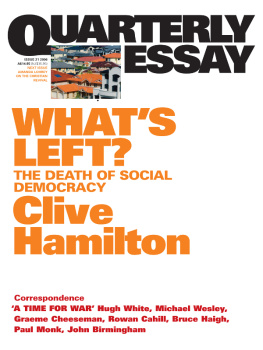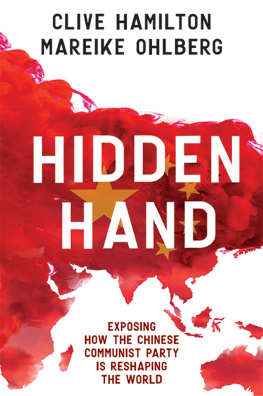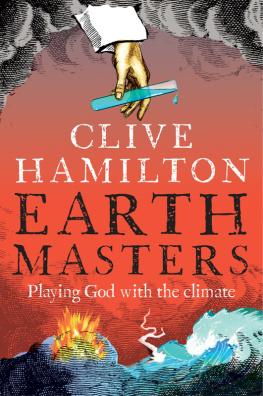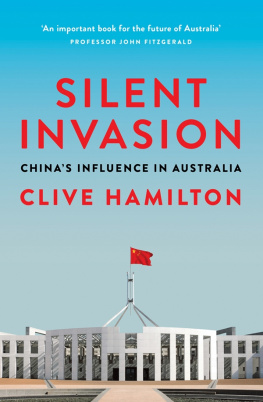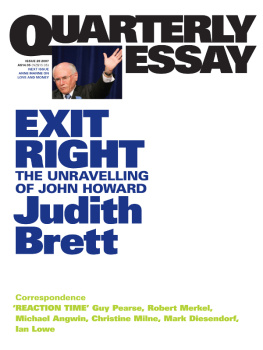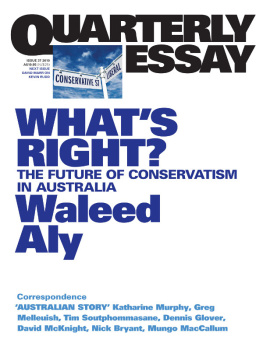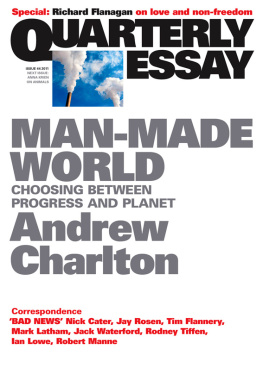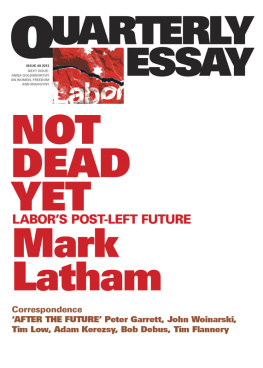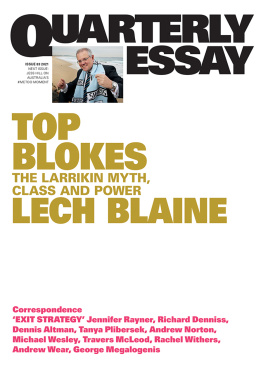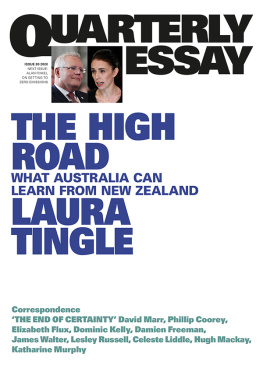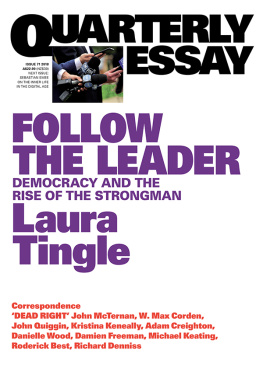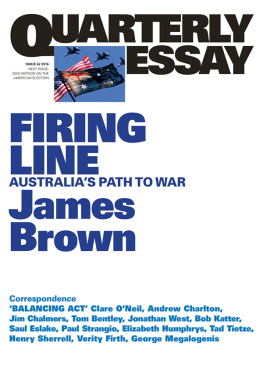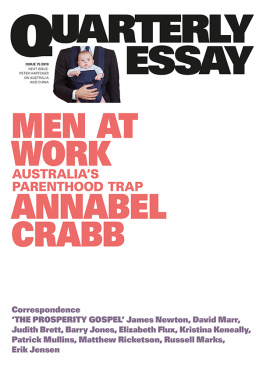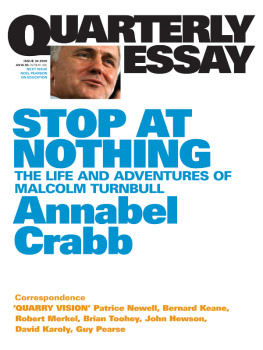Quarterly Essay is published four times a year by Black Inc., an imprint of Schwartz
Publishing Pty Ltd
Publisher: Morry Schwartz
ISBN 186-395-1822
ISSN 1832-0953
Subscriptions (4 issues): $49 a year within Australia incl. GST (Institutional subs. $59). Outside Australia $79. Payment may be made by Mastercard, Visa or Bankcard, or by cheque made out to Schwartz Publishing. Payment includes postage and handling.
To subscribe, fill out and post the subscription card, or subscribe online at:
www.quarterlyessay.com
Correspondence and subscriptions should be addressed to the Editor at:
Black Inc.
Level 5, 289 Flinders Lane
Melbourne VIC 3000 Australia
Phone: 61 3 9654 2000
Fax: 61 3 9654 2290
Email:
quarterlyessay@blackincbooks.com (editorial)
subscribe@blackincbooks.com (subscriptions)
Editor: Chris Feik
Management: Sophy Williams
Production Co-ordinator: Caitlin Yates
Publicity: Anna Lensky
Design: Guy Mirabella
Printer: Griffin Press
WHATS LEFT?
The Death of Social Democracy
Clive Hamilton
LABOR LOST
In May 2002, at the invitation of Senator Kim Carr, I addressed the national conference of the ALP/Trade Union Left, which is held annually in Canberra. In thinking about what I would say, I tossed up whether to play it safe and state the usual things about social injustice and the Howard governments penchant for penalising the most vulnerable, or to take a risk and give voice to my growing sense of the irrelevance of the traditional Left arising from its failure to develop a politics that resonated with the times. This was the view I was to publish a year later in my book Growth Fetish, but in 2002 I was still reluctant to criticise those on the progressive side of politics whose commitment to social justice remained undimmed while all those around them, including the dominant faction in the Labor Party, had been seduced by the neo-liberal story of the wonders of the free market.
Deciding that for its own good the Left needed to be challenged rather than massaged, I addressed the hundred or so delegates without pulling any punches. I argued that they, and the Left more generally, were bereft of ideas, that they were wandering in the wilderness mouthing the same old slogans to people who no longer wanted to hear them. In the face of a market fundamentalism that carried all before it, the Left had failed to understand that the world had been transformed in ways that rendered their ideas impotent and irrelevant.
We must face up to the facts, I lectured. While rooted in historical reality, the Lefts deprivation model, which insists that the mass of people are suffering from material deprivation, is today the opposite of the truth. The dominant characteristic of contemporary Australia is not deprivation but abundance.
I went on to talk about income levels scarcely imaginable in the 1950s, about the love of consumer goods, the soaring demand for private schooling and the comfortable suburbs filled to bursting with DVDs, swimming pools and 4WDs. I also talked about money hunger, overwork, perceived meaninglessness and the sicknesses of affluence, and pointed to the great contradiction of modern politics:
Despite the fantastic promises of material progress, and the extraordinary success of capitalism in delivering undreamt-of wealth for ordinary people, we have to make a horrible admission - the people are still not happy.
I finished off by calling for a politics based on a new understanding of a society characterised by both widespread prosperity and entrenched alienation, a politics that would help people to step out of the gilded cage and experience true autonomy and authentic lives, a politics for a society in which citizens are committed to a rich life rather than a life of riches.
Not unexpectedly, the speech elicited strong reactions, both immediately and in the weeks following. As I sat down - catching a glimpse of a shell-shocked Kim Carr, who later let on that it would never again fall to him to invite the conferences guest speaker - some on the more traditional, trade-union wing of the Left stood to condemn me for abandoning the poor, for failing to understand the extent of material deprivation in underprivileged areas, and for ignoring the problems caused by growing inequality. Voices of support, by contrast, were muted.
But as the session broke up and delegates spilled out of the room, it became apparent that others had found my provocation, as one termed it, a breath of fresh air. They too had been wondering if the old-left view of the world had been out-run by history. Among the many comments that I received including reactions to a newspaper opinion piece a few days later summarising the argument were the following:
Congratulations Your emphasis on the consumer society, afflu-ence, etc., is extremely timely.
Let me remind you of some salient facts you have omitted in your portrayal of contemporary Australia as enormously wealthy Your article was the most refreshing thing I have read in a newspaper for a long time and gives me confi dence that the issues you raised are on the agenda.
After reading extracts in the press of your rather shallow recent speech I am inclined to think that people like you tend to live in your own little insulated world and assume that everyone else shares the same inflated salary etc. that you enjoy.
I was present when Clive Hamilton spoke. He has a valid point, albeit delivered in a rather over-the-top way.
While your paper may have been confronting to some, I think it was generally well received. It was certainly a key topic of conversation at lunch and most who I spoke to were very positive.
The events of the conference were reported by the journalist Glenn Milne in his Monday column in the Australian, where he suggested that the demand for a new direction went over like a lead balloon. One who was not at the conference, because he was part of the ALPs Right faction, reacted with characteristic gusto. The shadow assistant treasurer Mark Latham wrote in an email discussion group:
This is the ultimate sell-out of the Green Left: post-material basket-weaving for gentrified inner-city types like Clive, while those of us in the suburbs should simply forget about the public housing estates down the road, with their 40 per cent unemployment rates and 80 per cent welfare dependency. Let them eat lentils seems to be the Hamilton mantra. How pathetic.
Latham, whom I had unkindly referred to in my speech as the Sage of Werriwa, followed up with an opinion piece along the same lines in the Murdoch broadsheet a fortnight later. Yet, as we will see, by the time he became leader of the Labor Party four years later, Mark Latham seemed to have undergone something of a transformation. This essay is an attempt to track the wider meaning of that transformation, and to take up the unfinished business it represents for the ALP and the nation.
In the latter part of the nineteenth century, the emerging labour parties found their political identity: they were social democratic parties, some of whose members, especially those in the trade unions, went further and gave their allegiance to democratic socialism. The distinction between social democracy and democratic socialism was always blurred, but it roughly reflected a difference over the extent to which the means of production should be publicly owned. In practice, though, the side one took reflected not so much a judgment about how best to manage the economy for the benefi t of working people, but the degree of anti-capitalist sentiment that animated the party member.

